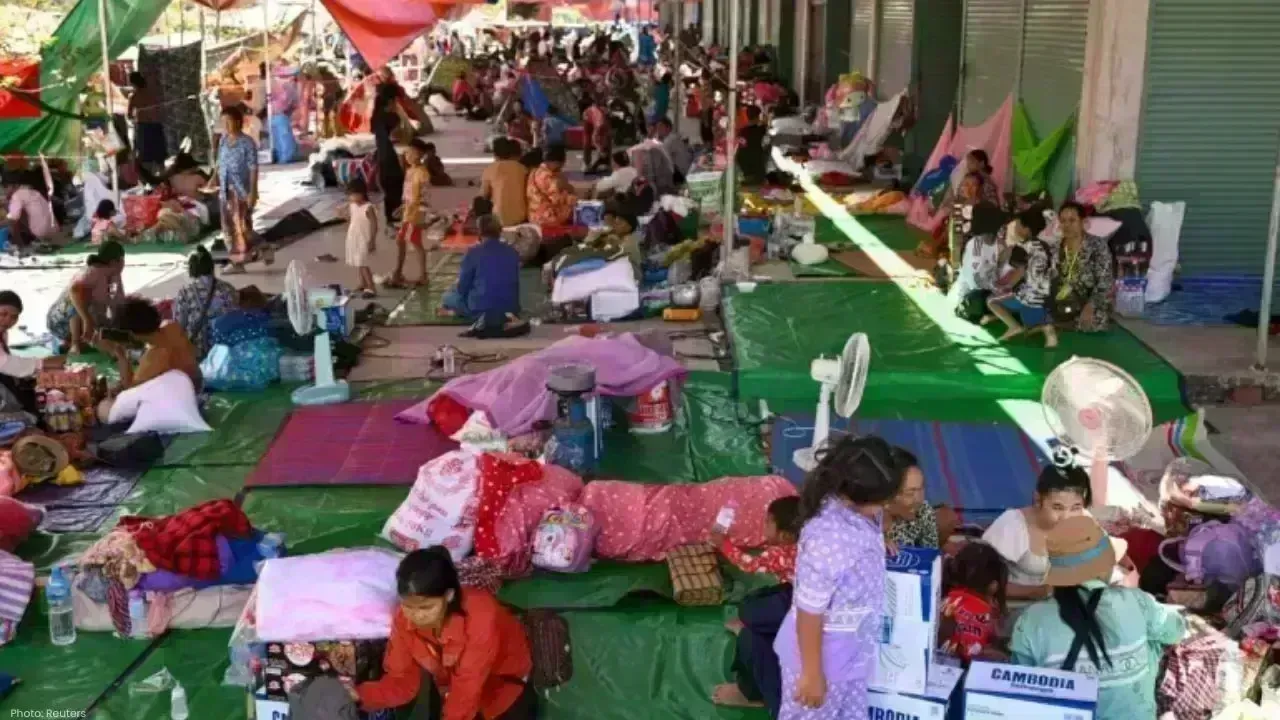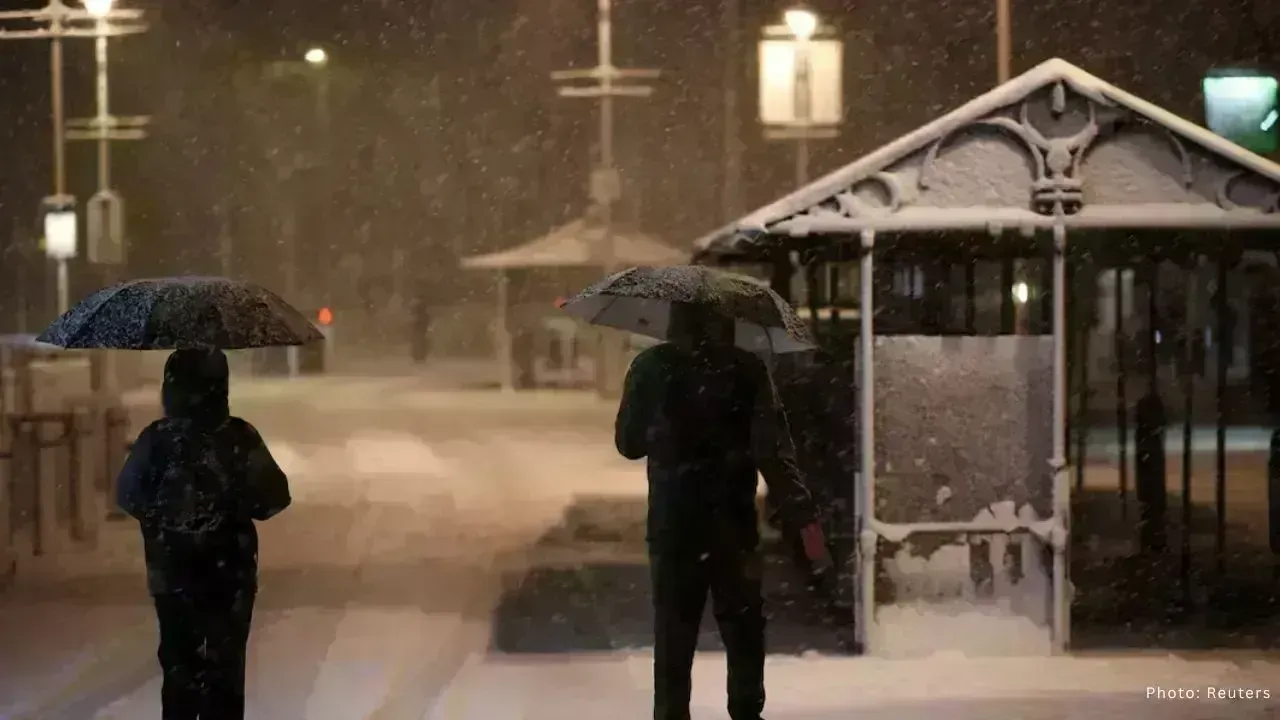You have not yet added any article to your bookmarks!

Join 10k+ people to get notified about new posts, news and tips.
Do not worry we don't spam!

Post by : Anis Farhan
The domestic travel scene in India is alive with movement. Families are taking advantage of school holidays, newlyweds are booking romantic escapes to the coast, and weekend adventurers are eager to leave the bustle of the city. Yet, this week has brought about unexpected developments, as the India Meteorological Department has issued various weather warnings across several regions. Heavy rainfall, thunderstorms, gusty winds, and cold wave alerts have led to disruptions in travel schedules, compelling many travelers to reconsider their plans.
Though variations in weather are common, the extremities and unpredictability observed this week have surprised many. Holidaymakers who anticipated clear skies are now contending with the risk of cancelled beach outings, delayed flights, and altered driving conditions. These alerts are particularly crucial for those traveling to southern coastlines and the central states, where conditions are evolving rapidly.
This article delves into the effects of these weather alerts on travel across India, highlights essential considerations for travelers, discusses responses from the hospitality and transport sectors, and offers actionable tips to alleviate disruptions. Navigating through regional specifics, this guide aims to clarify the current situation and equip travelers to stay informed and prepared.
A new cycle of weather disturbances has prompted warnings for Tamil Nadu, Kerala, coastal Andhra Pradesh, Rayalaseema, and the Andaman and Nicobar Islands. These areas are forecasted to experience heavy rainfall, thunderstorms, and strong winds. The influx of deep moisture alongside unstable atmospheric conditions has triggered an uptick in rainfall activity, with low-lying areas facing potential water-logging.
For travelers, this translates to delays, reduced visibility, slick roads, and the potential suspension of water-based activities along coastal areas. Resorts, transportation services, and local authorities are already implementing measures to manage short-term disruptions.
As the south deals with rains, central India is seeing a noticeable drop in temperature. The cold wave affecting places in Madhya Pradesh and nearby regions is resulting in early fog, biting winds, and a chilling atmosphere. For those aiming to visit national parks, hill stations, or winter retreats in central India, the sudden temperature drop necessitates adjustments in attire and plans.
The timing of these alerts is critical as they coincide with a peak domestic tourism period, and weather fluctuations can lead to the following:
Flight and train schedules may face delays or rerouting.
Road journeys might become risky due to water-logging or slippery surfaces.
Coastal resorts might limit outdoor activities or marine adventures.
Trips to hill stations may require warmer clothing and adjusted itineraries.
Families with children or elderly travellers might face additional hurdles.
While weather disruptions present challenges, they don't render vacations impossible—flexibility and planning are key.
Airlines and rail services are typically the first to react during unpredictable weather patterns. Stormy conditions in the south lead to delayed departures, slow arrivals, and occasional cancellations. Water-logging around airports and railways can complicate operations further.
Travellers heading to affected areas should brace for:
Longer waiting times at airports
Potential rescheduling of connecting flights
Possible flight diversions
Delayed or rescheduled trains
Crowded airport lounges and terminals
Traveller Tip: Aim to arrive earlier than usual during periods of weather alerts and enable notifications for real-time updates from your travel provider.
Southern beach locales—especially in Tamil Nadu, Kerala, and the Andaman Islands—are adjusting their operations in light of the ongoing weather. Resorts may limit or rearrange water activities, sunset dinners, island excursions, and outdoor seating. Unpredictable rain and rough seas create unsafe conditions for recreational pursuits.
Travellers can anticipate:
Indoor activities as alternatives to beach plans
Postponements of boat trips or ferry rides
Switch to indoor entertainment instead of outdoor events
Temporary shutdown of children's play zones
Adjusted check-in or check-out times due to transport delays
While resorts strive to deliver a pleasant experience, the weather will ultimately dictate conditions.
Central Indian destinations known for cooler climates are experiencing a swift change. For those traveling for wildlife viewing, early-morning excursions, or nature trails, shifts in timing and packing for colder conditions become essential.
Common disruptions include:
Colder than expected early-morning safaris
Reduced visibility because of fog
Chilly winds affecting outdoor dining or sightseeing
Increased heater use in accommodations
Potential road delays due to low visibility
Weekend travelers, particularly those planning last-minute escapes, are amongst the most impacted. Quick getaways depend on precise timing, and even mild disruptions can derail plans. Whether it’s a sudden downpour obstructing views or delays in flights cutting into the weekend, adaptability is essential.
General updates like "rain in the south" or "cold in the center" aren't sufficient. Seek forecasts for the specific district or town you're visiting for a more reliable outlook.
Examine your travel arrangements—flights, trains, accommodations, and activities—to identify those that offer flexibility with date changes. Certain service providers may offer waivers during significant weather events; stay informed to avoid last-minute cancellations.
If your trip is tightly scheduled, consider adding some wiggle room. Delays due to weather can disrupt even the best-laid plans. Arriving earlier or scheduling fewer hard commitments allows for easier adaptation.
If your trip heavily relies on outdoor attractions, compile a backup list of indoor activities such as museums, cultural centers, cooking classes, or spa visits. These options can salvage your plans in the event of bad weather.
Smart packing is the key:
For rainy southern locations: a waterproof jacket, grippy sandals, a compact umbrella, and quick-dry clothing.
For cold-wave areas in central India: warm layers, gloves, wool caps, scarves, and sturdy footwear.
For all trips: charger, flashlight, extra snacks, and a travel-friendly first-aid kit.
Transport conditions can change rapidly during weather events. Use apps and reliable sources to keep track of the status of flights, trains, and road conditions.
Travel insurance that covers weather-related disruptions can be invaluable. Verify if your policy includes arrangements for cancellations, changes, or adjustments.
Resorts in southern coastal areas are adapting their activity schedules. Many are moving dining indoors, facilitating indoor activities or contests, and preparing for late arrivals due to transport delays.
In island regions like the Andamans, ferry services may be temporarily halted or slowed during rough seas. Operators are following safety protocols and often alert travelers of changes in advance.
Tours featuring outdoor activities—such as treks and sightseeing—are being postponed or shortened to ensure guest safety. Operators are suggesting indoor cultural excursions, workshops, or heritage visits instead.
Consider a couple traveling from Bengaluru to a beach resort in Kerala for a three-day getaway. Upon arrival, cloudy skies greet them, but the situation seems manageable. However, the following day brings a heavy rainfall advisory, leading to the cancellation of their snorkeling trip, the relocation of a beachfront dinner under shelter, and the postponement of their island excursion. Signs of water-logging appear on the roads near the resort, prompting them to limit their travel distance.
Despite the resort's efforts to organize indoor games, culinary classes, and spa offerings, the travelers realize certain expectations will have to be adjusted. Although their trip remains tranquil, their initial plans undergo significant revision. This scenario encapsulates the experiences many holidaymakers might face when unexpected weather disturbances arise.
As opposed to extended business trips, holiday schedules are more compact. Even minor disruptions can significantly impact overall enjoyment.
Vacations focusing on beaches, trekking, or water sports are heavily influenced by weather conditions. Rain or storms can drastically alter planned activities.
After lengthy periods spent indoors, travelers are seeking flawless experiences. Consequently, disruptions feel particularly disappointing, making prior planning even more vital.
Resorts and travel operators must navigate guest safety alongside satisfaction. Weather disruptions necessitate operational adaptations that can redefine guest experiences.
Expect heavy rain in specific areas.
Thunderstorms may jeopardize outdoor and water-based plans.
Winds can create conditions unsafe for boat operations.
Urban locations may experience temporary water-logging.
Expect notable temperature drops.
Foggy mornings could decrease visibility for road users.
Outdoor excursions may necessitate warmer clothing and adjusted schedules.
Flight itineraries could face real-time changes.
Train services might slow down during heavier rainfalls.
Road conditions could shift throughout the day.
Should prevailing weather patterns persist, travelers can anticipate ongoing fluctuations over the upcoming days—particularly in southern coastal regions. Rain may subside depending on the atmospheric system's trajectory, while cold-wave conditions in central India may continue until temperatures stabilize.
The upcoming week warrants caution, especially for travelers planning tightly scheduled itineraries or routes involving multiple connections.
Weather-related disruptions are on the rise, and this week's warnings illuminate how quickly holiday plans can shift throughout India. While situations may lead to delays and changes, a well-organized traveller can still have an enjoyable holiday.
The core message is straightforward: stay informed, be adaptable, and shape your plans around weather-specific scenarios rather than expecting ideal conditions. Whether venturing to the beaches of Kerala, hills of central India, or the serene shores of the Andamans, adequate preparation can transform a potentially challenging trip into a delightful, memorable experience.
This article serves as a general resource for travel awareness. It should not be deemed an official weather forecast or expert travel advice. Travellers are encouraged to consult authorized meteorological updates and transportation notices before making decisions.










US Security Officials Drive S. Jaishankar 416 Miles During Shutdown
US security drove External Affairs Minister S. Jaishankar 416 miles during a government shutdown to

US Pledges $45M to Strengthen Fragile Thailand-Cambodia Truce
The US will provide $45 million in aid to help stabilize the fragile truce between Thailand and Camb

U.S.-India Trade Deal Falters as Modi Skips Trump Call Says Lutnick
U.S. Commerce Secretary Lutnick reveals India wasn’t ready for a trade deal after PM Modi avoided a

Boosting Northern Luzon Economy: Marcos Jr. Inaugurates Modern Camalaniugan Bridge
President Marcos Jr. opens the ₱2.3B Camalaniugan Bridge, enhancing connectivity, trade, and economi

Trump warns China on Taiwan, says any change would upset him
Donald Trump says Taiwan’s future depends on Xi Jinping but warns he would be unhappy if China tries

Gold Prices Slide as Strong Dollar and Futures Selling Weigh
Gold prices dipped as investors adjusted positions ahead of a commodity index reshuffle, while a str